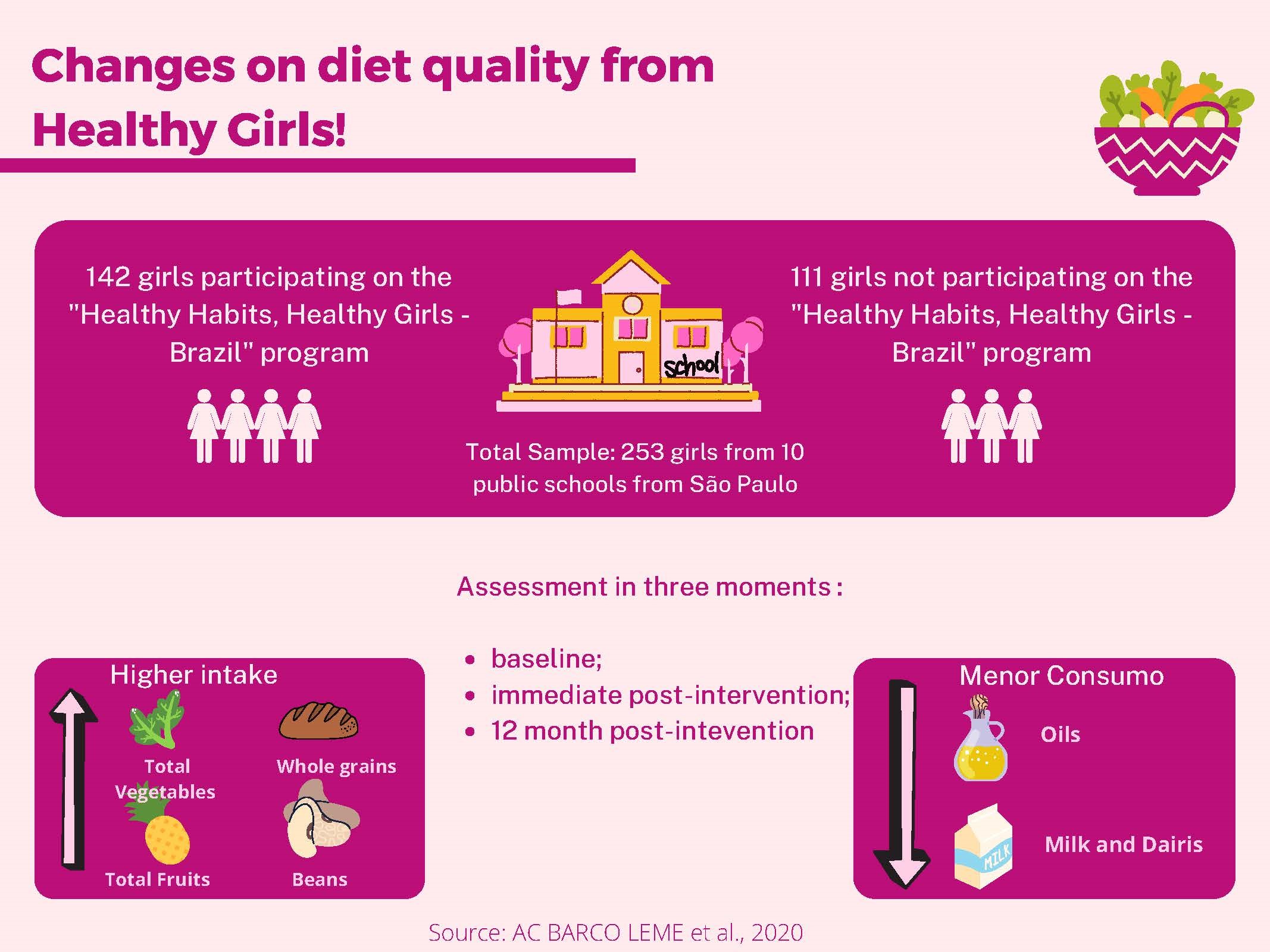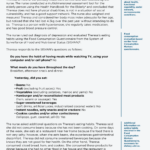Ana Carolina Barco Leme, post-doctorate, Faculdade de Saúde Pública, Universidade de São Paulo, Brazil.
Dr. Sonia Tucunduva Philippi, Faculdade de Saúde Pública, Universidade de São Paulo, SP, Brazil.
Dr. Regina Mara Fisberg, Faculdade de Saúde Pública, Universidade de São Paulo, SP, Brazil.
Camila Laurentino Guedes, graduate of nutrition of Centro Universitário São Camilo, Centro Universitário São Camilo, SP, Brazil.
 The “Healthy Habits, Healthy Girls – Brazil” was developed by researchers from the University of São Paulo and was an adaptation of an Australian program (Lubans, Morgan et al. 2010) for obesity prevention for adolescent girls. The project was conducted in the 1st semester of 2014 in 10 public schools from the city of São Paulo. Five of them participated in the program, while the others served as a basis for comparison.
The “Healthy Habits, Healthy Girls – Brazil” was developed by researchers from the University of São Paulo and was an adaptation of an Australian program (Lubans, Morgan et al. 2010) for obesity prevention for adolescent girls. The project was conducted in the 1st semester of 2014 in 10 public schools from the city of São Paulo. Five of them participated in the program, while the others served as a basis for comparison.
The program had several components for helping to change lifestyle behaviors. They included cooking classes and nutrition workshops, enhanced physical education classes for girls, interactive seminars, nutrition and physical activity weekly messages, handbooks, WhatsApp® group messages, and monthly parents’ newsletters. Several behaviors were assessed before the start of the program, at immediate post-intervention (6 months), and after 6 months from the end of the program (12 months).
From the components evaluated, the diet was assessed using an index that determines their quality (Previdelli, Andrade et al. 2011) with 9 adequacy and 3 moderation components. Thus, it was assessed the diet quality of 253 girls after participating in the prevention program for weight-related concerns. The diet quality was assessed in the article intitled “Changes in diet quality 6 and 12 months post-intervention: the Healthy Habits, Healthy Girls: a Brazilian study”(Leme, Philippi et al. 2020).
These programs approach to focus on a positive relationship between food and weight, through integrating risk factors for eating disorders, i.e., body image satisfaction, weight control behaviors, and weight-teasing (Leme, Haines et al. 2021). Although the adolescents have not presented a body weight reduction, they showed maintenance in a healthy weight, with improvement on overall diet quality. Some diet quality components showed an improvement after the intervention, and they were total fruits, total vegetables, and dark green and orange vegetables, and whole grains.
Programs such the “Healthy Girls” can serve as a framework for implementation in Brazilian schools for the encouragement of changes in lifestyle behaviors.
References
LEME, A. C. et al. Impact of strategies for preventing obesity and risk factors for eating disorders among adolescents: a systematic review. Nutrients [online]. 2020. [viewed 16 November 2020]. https://doi.org/10.3390/nu12103134. Available from: https://www.preprints.org/manuscript/202008.0299/v1
LEME, A. C., et al. The “Healthy Habits, Healthy Girls” randomized controlled trial for girls: study design, protocol, and baseline results. Cadernos de Saúde Pública [online]. 2015, vol. 37, n. 7, pp. 1381-1394 [viewed 16 November 2020]. https://doi.org/10.1590/0102-311X00136014. Available from: http://ref.scielo.org/zg6gv6
LUBANS, D. R. et al. The Nutrition and Enjoyable Activity for Teen girls (NEAT girls) randomized controlled trial for adolescent girls from disadvantaged secondary schools: rationale, study protocol, and baseline results. Bmc Publica Health [online] 2010, vol. 10 [viewed 16 November 2020]. https://doi.org/10.1186/1471-2458-10-652. Available from: https://bmcpublichealth.biomedcentral.com/articles/10.1186/1471-2458-10-652
PREVIDELLI, A. N. et al. A revised version of the Healthy Eating Index for the Brazilian population. Revista de Saúde Pública [online]. 2011, vol. 45, n. 4, pp. 794-798 [viewed 16 November 2020]. https://doi.org/10.1590/S0034-89102011005000035. Available from: http://ref.scielo.org/fff96g
To read the article, acess
LEME, A.C., et al. Mudanças na qualidade da dieta em 6 e em 12 meses pós-intervenção: Hábitos Saudáveis, Meninas Saudáveis: estudo brasileiro. Rev. Nutr. [online]. 2020, vol.33 [viewed 16 November 2020]. https://doi.org/10.1590/1678-9865202033e190184. Available from: http://ref.scielo.org/n7n7b7
External links
Revista de Nutrição – RN: https://www.scielo.br/rn
Como citar este post [ISO 690/2010]:



















Recent Comments